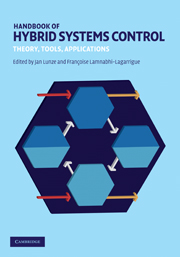Book contents
- Frontmatter
- Contents
- List of contributors
- Preface
- Notation
- Part I Theory
- Part II Tools
- 8 Overview of tools development and open problems
- 9 Verification tools for linear hybrid automata
- 10 Tools for modeling, simulation, control, and verification of piecewise affine systems
- 11 Modeling, simulation, and optimization environments
- 12 Interchange formats and tool integration
- Part III Applications
- References
- Index
8 - Overview of tools development and open problems
from Part II - Tools
Published online by Cambridge University Press: 21 February 2011
- Frontmatter
- Contents
- List of contributors
- Preface
- Notation
- Part I Theory
- Part II Tools
- 8 Overview of tools development and open problems
- 9 Verification tools for linear hybrid automata
- 10 Tools for modeling, simulation, control, and verification of piecewise affine systems
- 11 Modeling, simulation, and optimization environments
- 12 Interchange formats and tool integration
- Part III Applications
- References
- Index
Summary
For specific classes of hybrid formalisms, powerful algorithms and tools for analysis and synthesis have been developed in the recent years. This chapter gives a brief overview of the functionality of tools for control design, verification, simulation, optimization, and model transformation. The tools are presented in more detail in the next chapters
In the last decade, many tools for the design and control of hybrid systems have been developed. This chapter gives an overview of some important classes of such tools. The classes are ordered according to the expressivity of the underlying mathematical model. In the end, the interconnection of tools by means of a compositional interchange format is sketched and open issues are discussed. The tools are discussed in more detail in Chapter 9–12.
Control of switched linear systems
The MATLAB/Simulink-based tools discussed in Chapter 10 are based on (deterministic) discrete-time piecewise affine (PWA) mathematical models of hybrid systems. These tools offer the following support for the design and analysis of control systems:
Modeling: Two modeling languages with associated tools are presented: HYSDEL and MLD. HYSDEL models are based on interconnections of linear dynamical systems that are specified by means of finite-state discrete-time automata, IF-THEN-ELSE rules, and propositional logic statements. HYSDEL models can be transformed into MLD (mixed logical dynamical) models, which in turn can be transformed into discrete-time PWA models. […]
- Type
- Chapter
- Information
- Handbook of Hybrid Systems ControlTheory, Tools, Applications, pp. 279 - 284Publisher: Cambridge University PressPrint publication year: 2009
- 1
- Cited by

